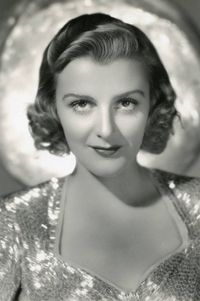Doris Nolan, a stunning blonde stage actress, was born on July 14, 1916, in New York City, where she was raised by her father, an importer. Initially, she began her acting career at New Rochelle High School, performing in plays, before being invited to join the Provincetown Players in 1933.
Following her graduation, Nolan worked as a secretary to the director, compensating for her tuition. She then pursued summer stock, taking on roles in plays such as "The Late Christopher Bean." Her early film contract was with Fox Film Corporation, but she was eventually dropped after struggling with her scenes in the Shirley Temple vehicle "Our Little Girl" (1935).
Undeterred, Nolan turned to Broadway, making her debut in 1935 with the mystery "Night of January 16th" as the femme fatale lead. She went on to star in several other plays, including "Arrest That Woman," "Tell Me Pretty Maiden," and "Lorelei."
Nolan's Broadway success led to a return to films, where she secured a contract with Universal. She starred in two "B"-level Universal pictures, "The Man I Marry" (1936) and "Top of the Town" (1937),both directed by Ralph Murphy. Her subsequent films included the romantic comedy "As Good as Married" (1937) and the classic comedy "Holiday" (1938),in which she played the sister of Katharine Hepburn.
Nolan continued to alternate between stage and screen, appearing in plays such as "Cue Passion" and "The Cat Screams," as well as co-starring in the long-running hit "The Doughgirls" (1942-1944). On film, she appeared in "One Hour to Live" (1939),"Irene" (1940),"Moon Over Burma" (1940),and "Follies Girl" (1943),before abruptly ending her film career.
In 1944, Nolan married Canadian actor Alexander Knox, with whom she co-starred in the play "The Closing Door" on Broadway in 1949. The couple later moved to England, where Knox was blacklisted by the House Un-American Activities Committee. Nolan slowed down her acting career, making occasional appearances in British films and television shows, including "The Servant" (1963),"Juggernaut" (1974),"The Romantic Englishwoman" (1975),and "Brideshead Revisited" (1981).
After her acting career, Nolan worked for an art gallery. She suffered a devastating family tragedy when her only child, Andrew Knox, died in 1987, likely due to suicide. Her husband, Knox, passed away in 1995, and Nolan followed him in death just a few weeks after her 82nd birthday on July 29, 1998, in Northumberland, England.


























